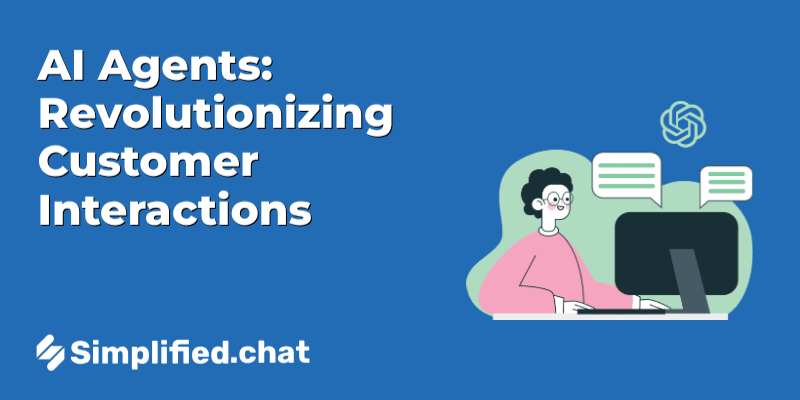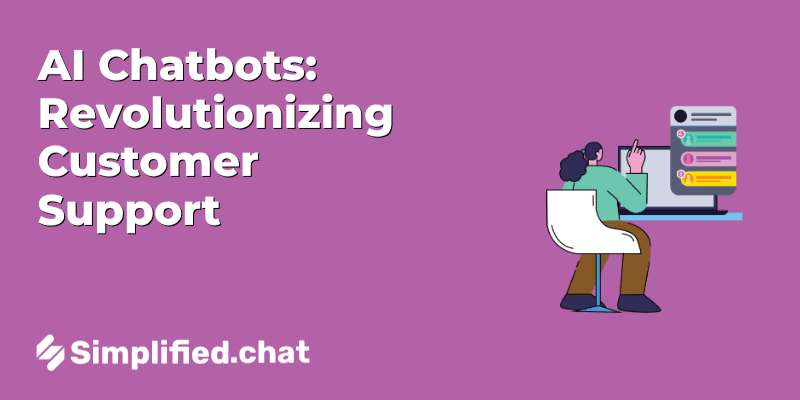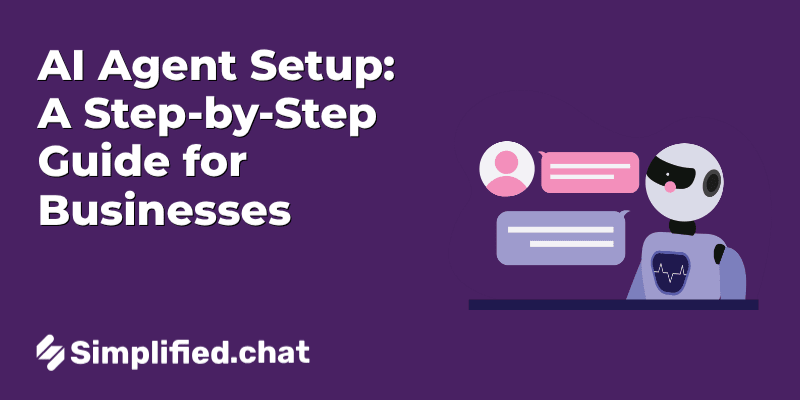Table Of Content
How Can AI Agents Help Solve Customer Support Challenges?
An AI agent is a computer program designed to autonomously interact with customers, providing support, answering questions, and resolving issues using artificial intelligence. These agents can understand natural language, learn from interactions, and adapt to provide personalized and efficient service.
According to a McKinsey report titled "Gen AI in customer care: Early successes and challenges," generative AI has the potential to transform contact centers by enhancing efficiency and customer experience. The report highlights that AI can address common pain points in customer support, such as long response times and inconsistent service quality. The report also acknowledges the challenges organizations may face when implementing AI solutions. For more details, you can access the report here.
Common Customer Support Pain Points

Customer support is at the heart of every thriving business, yet many organizations face recurring obstacles that hinder their effectiveness. Addressing these pain points requires understanding the core issues that degrade service quality and frustrate both customers and support teams alike.
Inconsistent Support Quality
One of the most common complaints customers have is receiving varied levels of support quality. Factors such as differing agent expertise, lack of standardized protocols, or insufficient training often lead to uneven service experiences. This inconsistency can erode customer trust over time and make problem resolution less predictable. Companies benefit from clear guidelines and continuous training to maintain a consistent support standard.
High Operational Costs
Running a customer support department, especially one with live agents, often involves significant expenses. Staffing, training, technology infrastructure, and ongoing management contribute to these costs. High operational expenses can limit the ability to expand support hours or invest in advanced tools. Strategically balancing cost management while maintaining responsive, quality service is a major challenge for many businesses.
Difficulty Scaling Support
As customer bases grow, the ability to scale support efficiently becomes crucial. Sudden spikes in inquiries, seasonal demand, or geographic expansion can overwhelm existing teams. Without scalable systems or flexible resources, response times lengthen and customer satisfaction dips. Businesses that plan for scalable solutions—like self-service options or modular support teams—can better adapt to fluctuating demands.
Limited Personalization
Generalized responses and lack of tailoring to individual customer needs can make support feel impersonal and unhelpful. Customers increasingly expect agents to understand their history and preferences, which requires access to comprehensive data and integration across platforms. Limited personalization reduces perceived value and can lead to repeat contacts for unresolved issues.
Lack of 24/7 Availability
In today's global and always-on market, customers often expect support around the clock. Businesses constrained by time zones or resource limitations may not provide continuous coverage, resulting in delayed responses and customer frustration. Incorporating automated chatbots, outsourcing during off-hours, or offering robust self-help resources are common strategies to bridge these gaps and meet modern expectations.
How AI Agents Address Common Customer Service Challenges

Customer service often grapples with issues such as delayed responses, inconsistent interaction quality, limited availability, language barriers, and difficulty in extracting actionable insights from vast data. AI agents are uniquely positioned to tackle these obstacles effectively, reshaping how businesses engage with customers.
Automated Responses
AI agents can handle a wide variety of routine customer inquiries without human intervention, providing instant, accurate replies. This automation reduces wait times significantly and frees up human agents to focus on more complex concerns. For example, common questions about order status, return policies, or troubleshooting steps can be addressed immediately via AI-driven chatbots. Studies show that automation in customer service can cut response times by up to 50%, directly improving customer satisfaction.
Personalized Interactions
Unlike generic scripted replies, AI agents analyze customer history and preferences to tailor responses on the fly. By leveraging data points from past interactions, AI can make recommendations, anticipate needs, and use a conversational tone that resonates with each individual. This level of personalization builds trust and loyalty, as customers feel understood and valued rather than treated as just another ticket number.
24/7 Availability
Businesses can no longer rely solely on traditional office hours to serve their global customers. AI agents operate round-the-clock without fatigue, delivering consistent and reliable support anytime it’s needed. Whether it’s midnight or a holiday, an AI-powered service ensures questions don’t go unanswered, which is essential in an age where consumer expectations are shaped by on-demand experiences across industries.
Multilingual Support
Language barriers often hinder clear communication and frustrate customers who do not speak the primary language of a business. AI agents equipped with multilingual capabilities break down these barriers by instantly processing and responding in multiple languages. This feature expands market reach and ensures inclusivity, allowing companies to engage diverse populations without the cost and delay of human translators.
Data-Driven Insights
Beyond just answering questions, AI agents collect and analyze interaction data to reveal trends and customer sentiments that might otherwise remain hidden. These insights help businesses identify common pain points, evaluate agent performance, and make informed decisions to improve products and services. Real-time analytics from AI systems empower companies to adapt strategies promptly rather than waiting for periodic feedback cycles.
Use Cases Across Industries

Artificial intelligence has been embraced by a wide range of industries, each finding unique ways to enhance user experience, streamline operations, and deliver efficient services. Looking beyond generalities, here’s a closer examination of how AI is actively transforming four key sectors.
E-commerce: Enhancing Shopping Experiences
Online retail platforms rely heavily on AI to personalize the shopping journey. From recommending products based on browsing and purchase history to enabling natural language chat support for customer inquiries, AI helps bridge the gap between convenience and personalization. For example, real-time inventory updates powered by AI improve customer trust by showing accurate product availability. Additionally, AI-driven chatbots assist with order tracking and returns, reducing wait times and operational overhead.
Healthcare: Providing Instant Medical Information
In healthcare settings, the timely delivery of accurate information can be critical. AI-powered assistants support medical professionals and patients alike by offering instant access to evidence-based guidelines, drug details, and potential side effects without the need to sift through extensive manuals. Beyond information retrieval, some systems help in symptom checking and triage, making preliminary assessments that free healthcare providers to focus on complex cases, ultimately improving care delivery and patient outcomes.
Education: Supporting Students and Staff
Educational institutions increasingly utilize AI to complement teaching and administrative tasks. For students, AI tutors provide tailored explanations and practice questions to reinforce learning at individual paces. Teachers benefit from AI tools that help generate quizzes, grade assignments, and manage routine questions from students, thereby reducing administrative workload. Furthermore, AI-powered platforms facilitate smooth communication between staff and students, enhancing the overall educational experience.
Financial Services: Offering Secure and Efficient Assistance
The financial sector utilizes AI to combine efficiency with strong security measures. AI chatbots handle common customer requests such as balance inquiries, transaction histories, and payment scheduling quickly, reducing wait times. Meanwhile, AI’s analytical capabilities help detect fraudulent activities by recognizing unusual patterns in real time. This dual approach not only elevates customer service but also fortifies the security framework of financial institutions.
Benefits of Implementing AI Agents

Integrating AI agents into business operations unlocks multiple advantages that directly impact both customer experience and company performance. These technologies are designed to handle repetitive tasks, analyze data efficiently, and provide personalized interactions, creating tangible improvements across various areas.
Improved Customer Satisfaction
AI agents offer responsive and consistent support around the clock, ensuring customers receive timely assistance whenever needed. Unlike human agents who may be limited by shifts or workload, AI can handle multiple interactions simultaneously without sacrificing quality. This leads to shorter wait times and quicker resolutions. Additionally, AI’s ability to recall customer history and preferences often results in more tailored and relevant responses, which fosters stronger customer loyalty.
Reduced Operational Costs
One of the most immediate benefits of AI agents is cost reduction. By automating routine inquiries and transactions, companies can decrease dependence on large customer service teams. This doesn’t merely cut labor expenses but also reduces the cost associated with training, error handling, and overtime. Over time, these savings contribute to a more streamlined budget allocation.
Increased Efficiency
AI agents excel at processing large volumes of data and performing multitasking without fatigue, which significantly boosts operational efficiency. Tasks that traditionally required manual input or follow-up can be automated, freeing up human agents to focus on complex issues. Studies indicate that businesses using AI for customer interactions see faster case resolutions and enhanced workflow continuity.
Enhanced Agent Productivity
Far from replacing human workers, AI agents often serve as valuable assistants. They can provide agents with real-time suggestions, customer background, and predictive insights during interactions. This collaboration enables human agents to handle inquiries more effectively and confidently. Consequently, productivity improves as agents spend less time searching for information and more time delivering solutions.
Better Data Insights
Another profound benefit of AI agents lies in their analytical capabilities. They gather and interpret customer interaction data at scale, uncovering patterns and trends that might otherwise go unnoticed. These insights help organizations make informed decisions, identify pain points, and optimize customer journeys. Moreover, continuous learning from AI enables ongoing improvements in service quality and product offerings.
Best Practices for Implementing AI Agents

Deploying AI agents effectively requires a strategic approach beyond simply selecting the technology. Successful implementation hinges on thoughtful choices aligned with your organizational needs, seamless integration, continuous improvement, and addressing ethical considerations. Let’s explore key best practices in this process.
Choosing the Right AI Agent
Selecting an AI agent involves more than picking the most popular or advanced model. Careful evaluation criteria include:
- Purpose alignment: Identify the specific tasks the AI agent should perform, whether it’s customer service, data analysis, or automation, and ensure the agent’s capabilities match these requirements.
- Vendor reliability and support: Consider the provider’s track record for updates, documentation, and ongoing assistance.
- Technical compatibility: Check if the AI agent supports the platforms and programming languages your organization uses.
- Customization options: Look for flexibility in training or tweaking the agent to fit your context.
Taking time in this phase reduces costly mismatches that can delay implementation.
Integrating with Existing Systems
AI agents rarely operate in isolation — they must work cohesively within your current infrastructure. Successful integration involves:
- Assessing system architectures to ensure smooth data flow between AI and legacy systems, minimizing bottlenecks.
- Using APIs or middleware that facilitate communication without requiring drastic overhauls.
- Collaboration between IT, data teams, and end-users to identify potential points of failure early.
By focusing on well-planned integration, organizations can avoid common pitfalls like data silos or inconsistent user experiences.
Training and Optimization
To maximize AI agent performance, continuous training and fine-tuning are crucial. This involves:
- Providing relevant, high-quality data for initial training and ongoing updates.
- Monitoring how the agent handles new or unexpected inputs and adjusting parameters accordingly.
- Incorporating feedback from human users to refine the agent's responses and decision-making processes.
Iterative training not only improves accuracy but also increases trust among users, ensuring wider adoption.
Monitoring Performance
Deploying an AI agent isn’t the end stage; it’s a continuous journey requiring careful oversight. Effective performance monitoring includes:
- Setting clear metrics aligned with business goals, such as response time, accuracy, and user satisfaction.
- Implementing dashboards or alert systems that provide real-time insights into agent behavior.
- Scheduling regular audits to identify and address any drift, bias, or degradation in performance.
This ongoing vigilance helps maintain effectiveness and prevents unnoticed issues from escalating.
Addressing Security and Privacy Concerns
AI agents process vast amounts of data, some of which can be sensitive. Responsible implementation demands strict attention to security and privacy by:
- Enforcing strong access controls and encryption for data handled by the AI agent.
- Complying with relevant data protection regulations to safeguard user information.
- Conducting regular security assessments to identify vulnerabilities related to AI components.
- Implementing transparent policies on how data is collected, stored, and used by the AI agent.
By prioritizing these aspects, organizations build trust with users and reduce risks of costly breaches or reputational damage.
Enhancing Customer Support Through AI Agents – Experience the Benefits Today
AI agents offer a practical approach to overcoming common challenges in customer support. By automating responses, tailoring interactions to individual customers, and providing consistent 24/7 availability, these agents improve satisfaction and ease demands on support teams. With Simplified.chat, integrating AI into your messaging platforms such as WhatsApp and Facebook Messenger is straightforward, enabling you to turn customer conversations into meaningful engagement and tangible results.
Discover how AI agents can assist your business by visiting Simplified.chat today. Explore our chatbot solutions, automate your support processes, and build a more efficient, responsive system that meets your customers’ needs whenever they arise.
Empower Your Business with Simplified AI Chatbot
Build Your Own AI ChatbotBuild Your First AI Agent Today
Build, train, customize and deploy your first AI chatbot in minutes




